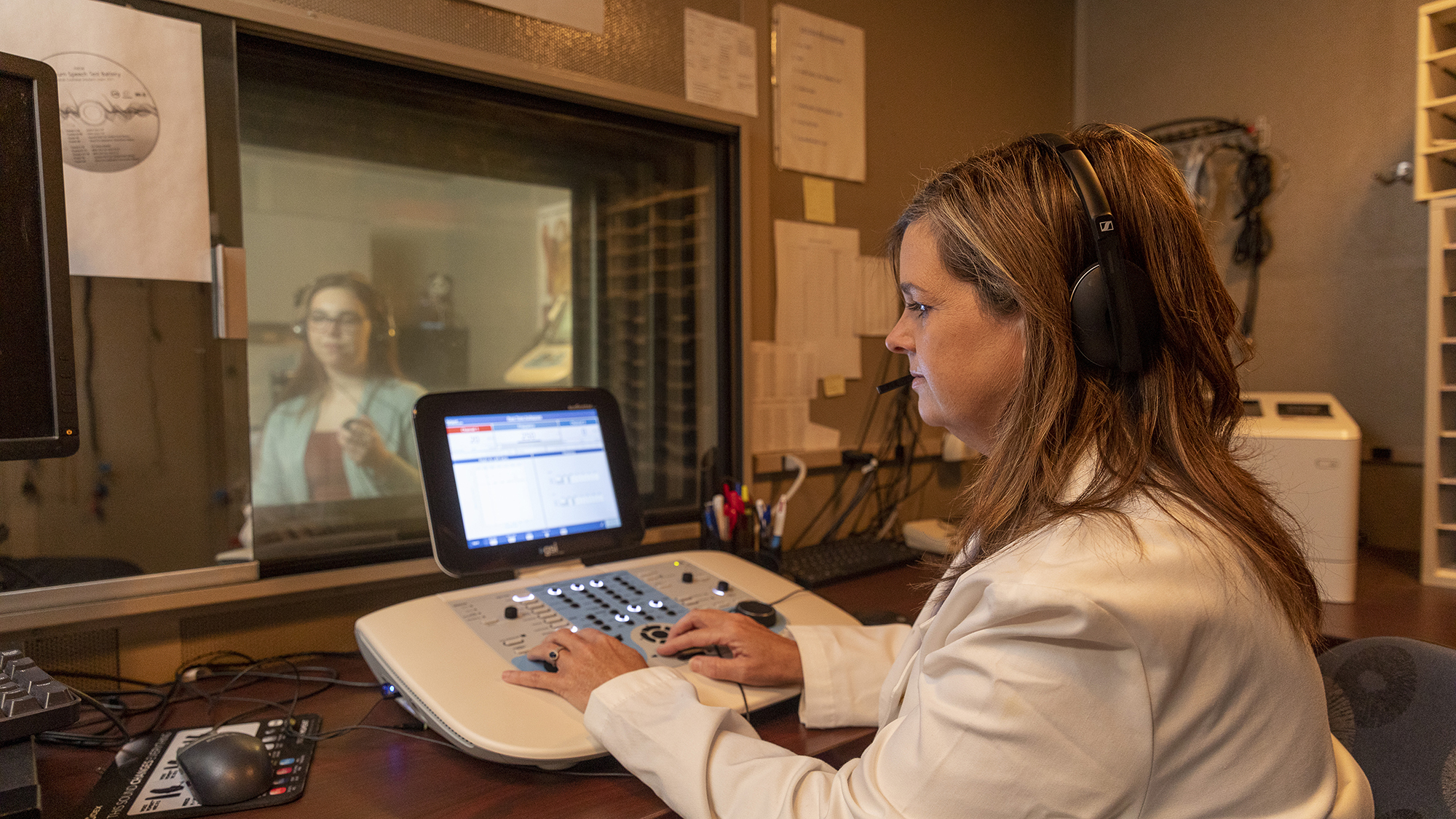Tinnitus And Sound Sensitivity
OVERVIEW
UNC Greensboro Speech and Hearing Center offers highly specialized services for patients with tinnitus and sound sensitivity disorders. We provide person-centered comprehensive evaluations for the development of an individualized plan of care that addresses each patient’s unique needs. General consultations about management options also are available. Ongoing monitoring and support is available as needed.
If you are interested in scheduling an appointment for a comprehensive evaluation or general consultation, please contact us at 336-334-5939. Management of severe tinnitus and sound sensitivity disorders awaits with the support of caring professionals.
WHAT IS TINNITUS?
Tinnitus often is described as the “ringing in the ears,” but also can be perceived as a roaring, buzzing, pulsing, or other sound that is not present in the physical world. Although an estimated 50 million Americans experience tinnitus, the severity of tinnitus varies greatly among individuals. In some cases, tinnitus causes significant distress and negatively impacts quality of life. Although tinnitus can be a symptom of hearing loss or other medical condition, it also can occur in isolation. Thus, a comprehensive tinnitus evaluation is required to determine a person’s candidacy for the preferred management approach. For more information, check out this educational article (PDF) written by UNCG audiologist, Dr. Lisa Fox-Thomas, who specializes in tinnitus management.
WHAT IS SOUND SENSITIVITY?
Some individuals experience sensitivity to sounds that significantly interferes with daily functions. Reduced tolerance for “loud” sounds is called hyperacusis and may be observed with or without tinnitus and hearing loss. Sensitivity to selective sounds such as soft repetitive noises (e.g., tapping, chewing, sniffing) is called misophonia. Activation of the body’s autonomic nervous system (“fight or flight” response) leads to a strong emotional reaction that can harm personal relationships and lead to social isolation.
MANAGEMENT APPROACHES
Management approaches for tinnitus and sound sensitivity disorders include directive counseling to educate patients about their symptoms and underlying neurophysiology. Addition of sound therapy provides relief and control for management of disturbance in the short term and desensitization over time. In addition, general wellness strategies are used as appropriate to help patients address associated conditions such as sleep disturbance, anxiety, and depression. Some patients also can benefit from “tinnitus coaching” to help them self-identify barriers to achieving their personal goals.
Approaches to sound therapy vary according to the stimulus used for short-term relief and long-term desensitization over time. Selection is dependent on the patient’s unique auditory profile as well as personal preference. Tinnitus Retraining Therapy (TRT) uses a noise generator and/or amplification with an integrated noise circuit to reduce awareness and disturbance caused by tinnitus and other sounds. The Neuromonics™ tinnitus treatment uses acoustically modified music at the resting heartrate to reduce tinnitus awareness while promoting desensitization over time. The Oasis Pro operates on an IOS platform and is available only through a qualified provider. Visit www.neuromonics.com for more information.
Heart rate variability training also is used to help patients override the “fight or flight” response and regain feelings of control. HeartMath® tools and techniques help patients harness the power of their breath to optimize heart rhythms and change their perceptions (www.heartmath.com).
ARE TREATMENTS EFFECTIVE?
Clinical “success” can be measured in different ways. Patients are counseled on realistic expectations and the role of motivation and adherence in achieving their goals. The majority of patients report significantly reduced tinnitus awareness and disturbance as well as improved sound sensitivity over time.
HOW MANY VISITS ARE NEEDED?
In general, patients are scheduled for follow-up office visits at regular intervals. Treatment is a journey and everyone’s experience is different. Patients are counseled on the importance of establishing a plan of care that works for them.
CONTACT
Director, Speech and Hearing Center
Lisa McDonald
[email protected]
Assistant Director, Speech and Hearing Center
Lisa Fox-Thomas
[email protected]
Phone 336.334.5939
Email [email protected]
Location
524 Highland Ave, 300 Ferguson Building, Greensboro, NC 27412
